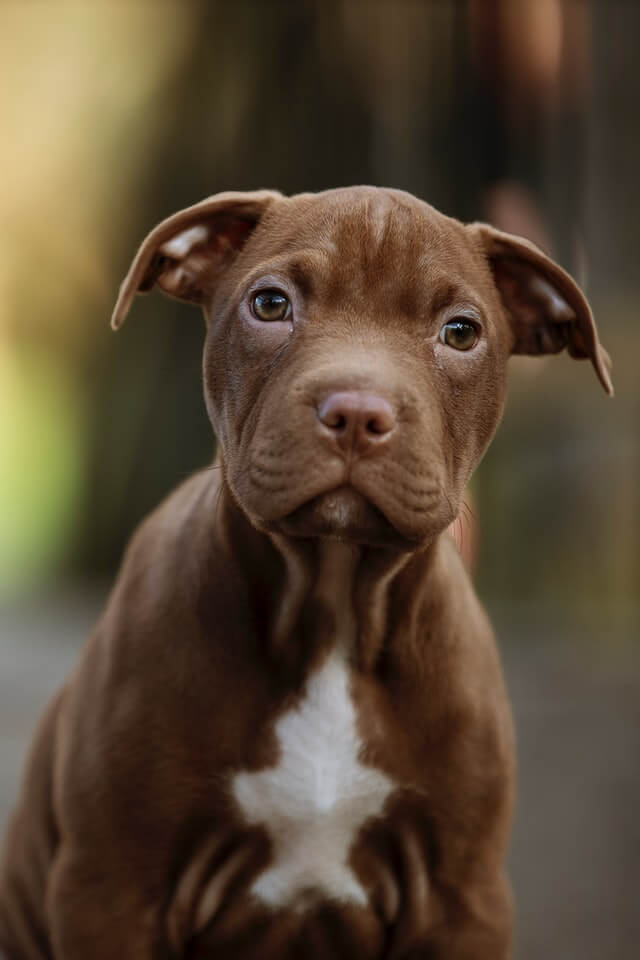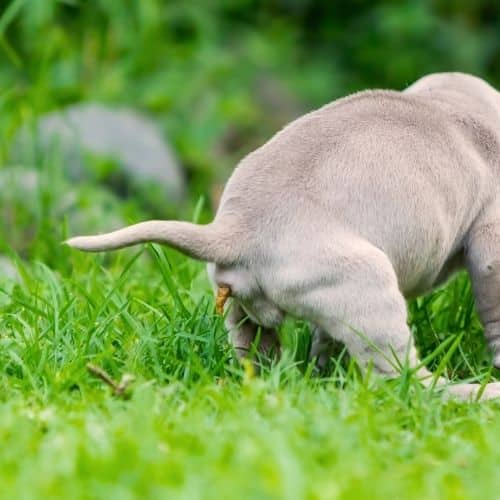Even though puppies might seem like simple, cute beings that exist to make life more bearable, they are also a huge responsibility. Getting a dog is a life decision that needs to be taken seriously, especially when thinking about the pup’s health and well-being. One thing every new dog owner should know is how many times a day should a puppy poop.
Knowing this simple yet essential information will not only help your puppy stay healthy but also save you from worrying about this unpleasant event ruining your carpet.
The stool of a dog is a good indicator of health. With this information, you will also have deeper insight when you should vs. when you shouldn’t take your puppy to the vet.
If you didn’t know, puppies are notorious for pooping a lot.
But, how much exactly? How much poop is too much poop for a puppy? And what do certain types of stools mean for a puppy? Stay tuned, and you’ll find out.
The Basic Puppy Poop Factors

The first thing to note when wondering how many times per day your pup should poop is the breed of the dog. Every puppy’s digestive system and metabolism is different, depending on the breed. For example, dogs that have been bred to hunt will usually poop more often than other breeds of dogs.
This is because they were bred with the purpose to hunt, an activity that takes lots of energy, meaning that their digestive system is faster resulting in pooping more often than other breeds.
The size of their excrement will also differ depending on the size of the breed. Who do you think poops more? A Great Dane or a pug? The bigger the dog, the bigger the digestive system.
The second important factor is the puppy’s food and water intake. A healthy diet combined with enough water will help your pup maintain regular bowel movements without too much effort on your part. A dog that is dehydrated or underfed won’t “go to the bathroom” as much as a healthy, energetic dog.
And finally, genetics, of course, also play a big role when it comes to this matter. Some puppies can get genes that tend to have problems with their bowel; this, sadly, isn’t impossible. This is why it’s important that you closely monitor your puppy if you think that there might be something wrong with its health.
Additional factors
Now that we have the basics down, let’s go over some additional factors regarding healthy puppy poop. Even though puppies are small, they grow quickly and they are also quick to develop habits.
Some dogs form a habit where they don’t relieve themselves during the night at all. Instead, they wait until the morning to go outside for a number two.
If your pup holds in their bowel movements or bladder movements during night, it might start pooping where it sleeps. It will wake up stinky, in its own feces, and will start thinking that it’s okay to poop where they sleep. The point here is that you simply need to pay attention to your puppy’s droppings.
When it comes to dog food, sometimes the type of food or ingredient within the food can cause a reaction, such as diarrhea, or indigestion.
You might also just have a pup that’s more sensitive to the fiber in the kibble, once it’s weaned off. If your dog is pooping more often than normal, it might also be because of the amount of fiber in the kibble.
Switch to high-fiber kibble if you notice that your pup is having issues with runny stools or constipation, because that might be your fix. The feeding schedule of the pup is also very important, since it might play a role in the amount of droppings your puppy has per day.
If you are inconsistent with the feeding schedule, don’t be surprised if your pup starts having inconsistent bowel movements.
What is a Healthy Amount of “Doggy Bathroom Breaks”?

When you have considered all the previous things mentioned, know that puppies need to poop way more often than a grown dog. Their digestive system is much smaller and much quicker since it has just started to develop. [1]
Newborn puppies can’t defecate by themselves, so they need to be stimulated in order to poop. Usually, this is what the mother does. Fun fact, mothers also tend to eat their babies poop, so don’t be alarmed. It’s safe for the mother, and it’s a primal thing. Just try your best to make sure that the puppies don’t get a taste for fecal matter in adulthood (because, boy, oh boy, do dogs like to eat poop).
A newborn puppy feeds around every two hours. This also means that they defecate every two hours. Usually, before they eat, however, pups can have their own preference. Regarding newborn puppies, a good unwritten rule would be anywhere for 5 to 8 bowel movements throughout the day.
However, this number can be slightly lower or higher and still be very normal and healthy depending on the breed. Below is a healthy puppy poop chart, based on the age of the puppy.
- Newborn puppies – 1 time every two to three hours.
- One week old puppies – 1 time every 3 hours
- Two week old puppies – 2 times per day.
- Four week old puppies – 3 times per day.
- Six week old puppies – 4 times per day.
- Eight week old puppy – 5 times per day.
- Puppies that are 10-12 weeks old (or until fully weaned from the mother’s milk) – 6 times per day.
When your puppy is 6 weeks old, it will be ready to start eating solid food. Make sure that you feed your puppy kibble that is good in quality and contains a healthy amount of fiber. At this point, your puppy should be pooping around 4-6 times per day.
It still sounds like a lot, but if your puppy is pooping less than that, you may need to increase their meal portions, and perhaps add in some more exercise to get those bowels moving!
Healthy Puppy Poop – What Does It Look Like?

Even though every pup is different, there are some main indicators for a healthy poop in puppies over 8 weeks. Let’s start with the consistency of the stool. It should definitely not be watery, or really hard pebble-shaped poop. A damp, yet compact stool (preferably in the shape of a log) is an indicator of a healthy digestive system. [2]
When you feed your dog with food that is of good quality, with natural and nutritious ingredients, chances are that your pup’s digestive system will remain healthy. Pay attention to the amount of fiber present in the kibble that you feed your dog, because too much or too little fiber can also cause diarrhea, indigestion and other digestive problems.
Listen to the advice of your vet regarding nutrition and fiber. High-fiber kibble tends to make dogs go number two more often.
Color
The optimal color of the puppy’s poop should be medium to dark brown. Light brown to dark brown is also normal. If the droppings are a bit green, don’t panic. Most commonly, it means that your dog ate grass. Dogs tend to do that when their stomachs are upset. Some pups just like eating grass as a snack, amongst other odd snacks.
If you see red or streaks of blood, go to the vet right away since that usually means an infection, rectal or internal injury, colitis, etc.
Black poop is a bad sign since it means that your pup is excreting digested blood. This might mean that your pup has a stomach ulcer, meaning that it needs medical attention. Pink, purple, and gray stools are also a one way ticket to the vet.
Yellow poop tends to happen when the diet of a dog changes because it tells us that the puppy’s body is experiencing food intolerance. Simply eliminating the food causing the intolerance will fix this issue.
Smell, shape and texture
Dogs fart and get gassy from time to time, however, if you are noticing that they are really stinky, especially when defecating, it might be a sign of a disease. A dramatic change in the smell of puppy poop is usually not a good sign. If the puppy poops smell really sweet, that’s also not a good sign.
Feces is feces, and it just doesn’t smell pleasant. However, pay attention if you notice considerable change in the smell, since it tells us that something is happening with your puppy’s health. The texture of it shouldn’t be too hard, mushy or liquid. A solid dark brown log is the healthiest poop for a dog.
Signs of healthy puppy poop:
- Damp, compact stool.
- Medium brown to dark brown.
- Log shaped.
- Regular smell.
- Size appropriate for the breed.
If your puppy is less than 5 weeks old and still has quite watery poop, this is normal. This is due to the milk of the mother. If the watery stool doesn’t stop after being weaned off, you might want to consult a veterinarian.
Depending on the breed of dog, it will take a few months for them to develop a stable bathroom routine. A puppy can hold it in for an hour by the time it’s one month old.
When it is two months old, it can hold it for two hours, and when it’s three months old it can hold it for three, and so on. When your pup is approaching adulthood, between 1 to 3 poops per day outside is what’s to be expected from a healthy adult dog.
Puppy Is Not Pooping Enough, What Do I Do?

This is a concern common amongst new puppy owners. As you now know, newborn puppies defecate the most often, but if your pup isn’t pooping enough, there are a few leading causes.
Your puppy might have worms, which you can check by putting their feces in a container of water overnight. If your dog has worms, by the morning, the worms will be out in the water. Or you can just simply take your puppy to the vet to diagnose them.
If your puppy is a bit older and eating solid food, and you feel like it’s not pooping enough – you may want to give it more food. Kibble mixed with wet food should do the trick. Start by adding 10% more food.
It’s also possible that your puppy might have developed a distaste for the food that you were feeding it with so far, which led to them starving themselves and therefore, less number twos.
Ideally, you would ask your veterinarian for nutrition advice or about a healthy feeding schedule. Or perhaps try a new brand of food, or adding some kind of moisture to the food to please your puppy’s appetite.
What Do I Do If My Puppy Poops Too Much?
We have established that newborn puppies tend to defecate more than 6 times per day, which is a lot of puppy poop. But how do you know when your puppy is defecating too much? Depending on the age of the dog, take a look at the healthy puppy poop chart first.
If you have a young puppy pooping 20 times a day, that’s a no brainer. Vet, ASAP! This might be a sign of an infection.
But if your older puppy is pooping too much, it may be because the pup needs a change in diet and/or exercise. For example, you might be overfeeding it, and puppy overeating leads to a loose stool and frequent defecation.
If this is the case, start measuring the food portions before you give them to your pup and keep a regular feeding schedule.
The Puppy Poop is Soft and Smelly, What Does This Mean?

There are several reasons why this can happen and most of them aren’t serious. Most commonly, this is a sign of either not eating enough or eating too much. It can also be a sign that your pup is not getting enough water or that it’s getting too much water.
Double check what amount of food and/or water is ideal for the current development stage that your dog is in. Exercise is also extremely important for the health of your pup. A lack of exercise might also bring behavioral issues, such as biting.
If adjusting the food/water for your puppy doesn’t help, your puppy gets enough exercise, but this problem still persists, it would be best to go to the vet. It’s most likely due to parasites or worms, which aren’t hard to treat when caught on time.
Sometimes, this simply happens because your puppy ate too much food for a day or two and their body didn’t handle it well. However, if you see blood in the stool or stools that resemble black tar, you should take it to the vet immediately.
This is a common sign of intestinal bleeding and should get medical attention as soon as possible.
What If My Puppy’s Poop is Really Hard?
The first thing that you want to do when your puppy’s poop is really hard is to check their meal size and water intake. This tends to happen to puppies when they are not eating or drinking enough.
However, if you are certain that your pup is eating and drinking enough for its age, then it might mean that they are sick and need a check-up from the vet. It would be best if you gave your vet a sample of your puppy’s hard stool for a more accurate diagnosis.
If you yourself want to check if your puppy has parasites or worms, you can put the stool in a container with water like explained previously. When your puppy is infected, depending on their body and digestive system, they might get either a really hard stool, a really soft stool or diarrhea.
Conclusion
As you can see, there are many factors that need to be taken into consideration in order to determine how many times your puppy should poop during the course of the day.
No matter if you are taking care of a newborn or a 10 week old puppy, you should pay attention to the frequency and consistency of their bowel movements, as well as abnormalities. In most cases, abnormalities happen due to not eating enough/eating too much, drinking too much water or not enough, not enough exercise or parasites/worms.
However, it’s always best to get the opinion of a professional. For example, you might have not even realized that your pup is losing weight due to too frequent potty breaks, which could be the warning sign of some internal issue.
This can also lead to the death of the pup, if you don’t pay attention.Now that you know all about puppy poop, you are ready to take on a pup. Good luck with the potty training, because that’s going to be headache number two.
